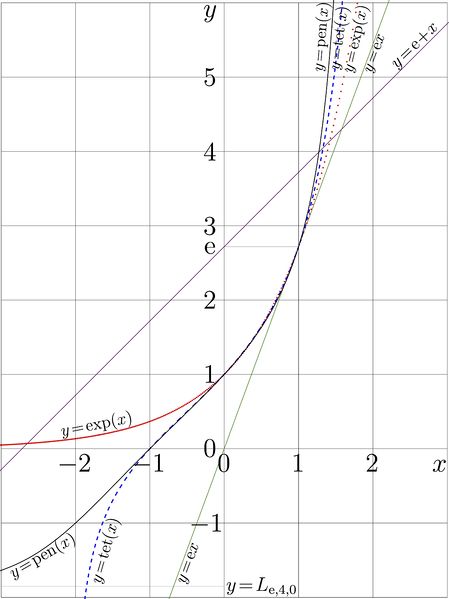File:Ackerplot400.jpg

Original file (3,355 × 4,477 pixels, file size: 805 KB, MIME type: image/jpeg)
Summary
| Title / Description
|
Explicit plot of 5 first ackermanns to base e: addition of e, multiplication by e, exponnt, tetration and pentation.
is plottec versus for , , , and . |
|---|---|
| Citizendium author & Copyright holder
|
Copyright © Dmitrii Kouznetsov. See below for licence/re-use information. |
| Date created
|
2014 |
| Country of first publication
|
Japan, Germany |
| Notes
|
This is figure 19.6 from the Russian book Суперфункции[1]. |
| Other versions
|
http://mizugadro.mydns.jp/t/index.php/File:Ackerplot400.jpg |
| Using this image on CZ
|
, then copy the code below to add this image to a Citizendium article, changing the size, alignment, and caption as necessary.
|
Please send email to manager A T citizendium.org .
Licensing
This media, Ackerplot400.jpg, is licenced under the Creative Commons Attribution 3.0 Unported License
You are free:
To Share — To copy, distribute and transmit the work; To Remix — To adapt the work.
Under the following conditions:
Attribution — You must attribute the work in the manner specified by the author or licensor (but not in any way that suggests that they endorse you or your use of the work).
For any reuse or distribution, you must make clear to others the licence terms of this work (the best way to do this is with a link to this licence's web page). Any of the above conditions can be waived if you get permission from the copyright holder. Nothing in this licence impairs or restricts the author's moral rights.
Read the full licence.
Description
The ackermanns satisfy equations
for
for
The additional requirements are applied for the uniqueness.
In particular, for the real , the real holomorphism is assumed, .
C++ generator of curves
Files fsexp.cin and fslog.cin should be loaded in order to compile the code below. #include <math.h> #include <stdio.h> #include <stdlib.h> #define DB double #define DO(x,y) for(x=0;x<y;x++) #include <complex> typedef std::complex<double> z_type; #define Re(x) x.real() #define Im(x) x.imag() #define I z_type(0.,1.) void ado(FILE *O, int X, int Y) { fprintf(O,"%c!PS-Adobe-2.0 EPSF-2.0\n",'%'); fprintf(O,"%c%cBoundingBox: 0 0 %d %d\n",'%','%',X,Y); fprintf(O,"/M {moveto} bind def\n"); fprintf(O,"/L {lineto} bind def\n"); fprintf(O,"/S {stroke} bind def\n"); fprintf(O,"/s {show newpath} bind def\n"); fprintf(O,"/C {closepath} bind def\n"); fprintf(O,"/F {fill} bind def\n"); fprintf(O,"/o {.01 0 360 arc C F} bind def\n"); fprintf(O,"/times-Roman findfont 20 scalefont setfont\n"); fprintf(O,"/W {setlinewidth} bind def\n"); fprintf(O,"/RGB {setrgbcolor} bind def\n");} /* end of routine */ #include "fsexp.cin" #include "fslog.cin" z_type pen0(z_type z){ DB Lp=-1.8503545290271812; DB k,a,b; k=1.86573322821; a=-.6263241; b=0.4827; z_type e=exp(k*z); return Lp + e*(1.+e*(a+b*e)); } z_type pen7(z_type z){ DB x; int m,n; z=pen0(z+(2.24817451898-7.)); DO(n,7) { if(Re(z)>8.) return 999.; z=FSEXP(z); if(abs(z)<40) goto L1; return 999.; L1: ;} return z; } z_type pen(z_type z){ DB x; int m,n; x=Re(z); if(x<= -4.) return pen0(z); m=int(x+5.); z-=DB(m); z=pen0(z); DO(n,m) z=FSEXP(z); return z; } int main(){ int j,k,m,n; DB x,y, p,q, t; z_type z,c,d, cu,cd; FILE *o;o=fopen("ackerplo.eps","w"); ado(o,608,808); fprintf(o,"304 204 translate\n 100 100 scale\n"); #define M(x,y) fprintf(o,"%8.4f %8.4f M\n",0.+x,0.+y); #define L(x,y) fprintf(o,"%8.4f %8.4f L\n",0.+x,0.+y); #define o(x,y) fprintf(o,"%8.4f %8.4f o\n",0.+x,0.+y); for(m=-3;m<4;m++) {M(m,-2)L(m,6)} for(n=-2;n<9;n++) {M( -3,n)L(3,n)} fprintf(o,"2 setlinecap 1 setlinejoin .004 W 0 0 0 RGB S\n"); M(-3.02,-3.02+M_E)L(3.02,3.02+M_E) fprintf(o,".007 W .3 0 .3 RGB S\n"); M(-1., -M_E)L(3.02,3.02*M_E) fprintf(o,".007 W 0 .5 0 RGB S\n"); fprintf(o,"1 0 0 RGB\n"); DO(n,306){x=-3.02+.02*(n-.5);y=exp(x); o(x,y); if(y>6.)break;} fprintf(o,".02 W 0 .8 0 RGB S\n"); DO(n,202){y=-3+.05*(n-.6);x=Re(FSLOG(y)); if(n/2*2==n) M(x,y)else L(x,y); if(y>6.)break;} fprintf(o,"0 setlinecap .016 W 0 0 1 RGB S\n"); DO(n,150){x=-3.03+.04*n;y=Re(pen7(x)); if(n==0) M(x,y)else L(x,y); if(y>6.)break;} fprintf(o,".01 W 0 0 0 RGB S\n"); DB L=-1.8503545290271812; DB K=1.86573322821; DB a=-.6263241; DB b=0.4827; M(-3,L)L(0,L) M(0,M_E) L(1,M_E) fprintf(o,".002 W 0 0 0 RGB S\n"); DB t2=M_PI/1.86573322821; DB tx=-2.32; fprintf(o,"showpage\n%c%cTrailer",'%','%'); fclose(o); printf("pen7(-1)=%18.14f\n", Re(pen7(-1.))); printf("Pi/1.86573322821=%18.14f %18.14f\n", M_PI/1.86573322821, 2*M_PI/1.86573322821); system("epstopdf ackerplo.eps"); system( "open ackerplo.pdf"); }
Latex generator of curves
\documentclass[12pt]{article} \paperwidth 604px \paperheight 806px \textwidth 1394px \textheight 1300px \topmargin -104px \oddsidemargin -92px \usepackage{graphics} \usepackage{rotating} \newcommand \sx {\scalebox} \newcommand \rot {\begin{rotate}} \newcommand \ero {\end{rotate}} \newcommand \ing {\includegraphics} \newcommand \rmi {\mathrm{i}} \begin{document} {\begin{picture}(608,806) %\put(12,0){\ing{penma}} \put(0,0){\ing{ackerplo}} \put(277,788){\sx{3.}{$y$}} \put(277,695){\sx{3.}{$5$}} \put(277,594){\sx{3.}{$4$}} \put(277,494){\sx{3.}{$3$}} \put(278,468){\sx{3.}{$\mathrm e$}} \put(277,394){\sx{3.}{$2$}} \put(277,294){\sx{3.}{$1$}} \put(277,194){\sx{3.}{$0$}} \put(258, 93){\sx{3.}{$-1$}} \put( 80,174){\sx{3.}{$-2$}} \put(180,174){\sx{3.}{$-1$}} \put(296,174){\sx{3.}{$0$}} \put(396,174){\sx{3.}{$1$}} \put(496,174){\sx{3.}{$2$}} \put(586,174){\sx{3.}{$x$}} \put(438,714){\sx{1.8}{\rot{85}$y\!=\!\mathrm{pen}(x)$\ero}} \put(460,716){\sx{1.8}{\rot{82}$y\!=\!\mathrm{tet}(x)$\ero}} \put(478,712){\sx{1.8}{\rot{77}$y\!=\!\mathrm{exp}(x)$\ero}} \put(504,712){\sx{1.8}{\rot{70}$y\!=\!\mathrm{e}x$\ero}} \put(538,718){\sx{1.96}{\rot{44}$y\!=\!\mathrm{e}\!+\!x$\ero}} \put(86,222){\sx{1.9}{\rot{11}$y\!=\!\mathrm{exp}(x)$\ero}} \put(20,30){\sx{1.9}{\rot{30}$y\!=\!\mathrm{pen}(x)$\ero}} \put(138,22){\sx{1.9}{\rot{74}$y\!=\!\mathrm{tet}(x)$\ero}} \put(252,22){\sx{1.9}{\rot{70}$y\!=\!\mathrm{e} x$\ero}} \put(308, 13){\sx{2.2}{$y\!=\!L_{\mathrm e,4,0}$}} \end{picture} \end{document}
References
- ↑
https://www.morebooks.de/store/ru/book/Суперфункции/isbn/978-3-659-56202-0
http://www.ils.uec.ac.jp/~dima/BOOK/202.pdf
http://mizugadro.mydns.jp/BOOK/202.pdf Д.Кузнецов. Суперфункции. Lambert Academic Press, 2014, in Russian; page 273, figure 19.6.
D.Kouznetsov. Holomorphic ackermanns. 2014-2015, in preparation.
File history
Click on a date/time to view the file as it appeared at that time.
| Date/Time | Thumbnail | Dimensions | User | Comment | |
|---|---|---|---|---|---|
| current | 18:55, 11 March 2022 |  | 3,355 × 4,477 (805 KB) | Maintenance script (talk | contribs) | == Summary == Importing file |
You cannot overwrite this file.
File usage
The following page uses this file:


















